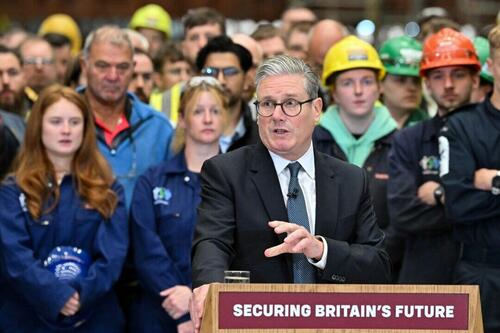
British Exports To US Suffer Record Slump As Tariffs Take Effect
Authored by Guy Birchall via The Epoch Times (emphasis ours),
UK exports to the United States suffered a sharp drop of 8.8 percent in April, as the effect of U.S. President Donald Trump’s sweeping tariffs began to take effect, official data revealed on June 12.
 British Prime Minister Keir Starmer at the BAE Systems shipyard in Govan, Glasgow, Scotland, on June 2, 2025. Andy Buchanan/PA Wire
British Prime Minister Keir Starmer at the BAE Systems shipyard in Govan, Glasgow, Scotland, on June 2, 2025. Andy Buchanan/PA WireAfter rising for the past four months, British goods exports declined significantly, by 2.7 billion pounds ($3.7 billion) in April 2025, with falls in exports to both the EU and non-EU countries.
“After increasing for each of the four preceding months, April saw the largest monthly fall on record in goods exports to the United States with decreases seen across most types of goods, following the recent introduction of tariffs,” Liz McKeown, the director of economic statistics at the Office for National Statistics (ONS), said.
After rising for the past four months, British exports to the U.S. market, including precious metals, dropped by 2 billion ($2.7 billion) in April 2025, the largest monthly decrease since records began in January 1997.
The value of goods exports to the United States is now at its lowest level since February 2022, the ONS added.
Auto manufacturers also reported lower output and exports to both the United States and the European Union.
British economic output declined during the month of April, with gross domestic product falling by 0.3 percent from the previous month.
Drop-offs in real estate and legal activity after a temporary tax break on house purchases ended also contributed 0.2 percentage points of the 0.3 percent fall in output in April, according to the ONS.
Britain’s total trade in goods and services deficit (excluding precious metals) also widened by 4.9 billion pounds ($6.7 billion) to 11.5 billion pounds ($15.6 billion) in the three months to April, as imports rose more than exports.
The pound dropped by a quarter of a cent against the dollar after the ONS data were released.
The fall off in trade across the Atlantic comes a little more than a month after London and Washington jointly announced a much-celebrated trade deal on May 8.
Though full details of the agreement have yet to be hammered out, what was revealed was that the UK would lower the tariff rate on U.S. goods from 5.1 percent to 1.8 percent.
The 10 percent U.S. universal baseline tariff rate on UK goods, however, remained in place.
At the time, British Prime Minister Keir Starmer said: “This historic deal delivers for British business and British workers protecting thousands of British jobs in key sectors including car manufacturing and steel.”
In a post on social media platform Truth Social, Trump called the deal a “full and comprehensive one that will cement the relationship” between the two nations.
No official document, however, has yet been signed by the two countries.
Britain’s economy grew in the first quarter of this year by 0.7 percent, more than other countries in the G7.
This prompted the Bank of England to revise up its full-year growth forecast to 1 percent in May.
However, the national bank revised its growth forecast for next year down to 1.25 percent, saying it expected United States tariffs to hit British output to the tune of 0.3 percent in three years’ time.
The news of the drop in trade comes a day after the UK’s finance minister, Chancellor of the Exchequer Rachel Reeves, delivered her first multi-year spending review to the Parliament in Westminster.
During her speech, she pledged major investments in health, housing, defense, and infrastructure.
At the core of the government’s plans to “renew Britain” is an annual increase of 29 billion pounds ($39.4 billion) in National Health Service funding.
Other pledges include 39 billion pounds for social and affordable housing over the next decade and confirmation of a previously announced 30 billion pounds ($40.8 billion) for nuclear projects, including 14.2 billion pounds ($19.3 billion) for a new nuclear plant.
Reeves said the budget boosts were “only possible” because of her decision to raise taxes in the previous autumn budget, reaffirming that her fiscal rules are “non-negotiable.”
The opposition Conservative Party, however, described the plan as “not worth the paper that it is written on.”
Shadow Chancellor Mel Stride said Reeves has “completely lost control,” suggesting that tax hikes in the fall are inevitable.
“This is the spend now, tax later review, because [the chancellor] knows she will need to come back here in the autumn with yet more taxes and a cruel summer of speculation awaits,” he told the Commons.
Tyler Durden
Fri, 06/13/2025 – 05:00

 6 miesięcy temu
6 miesięcy temu












